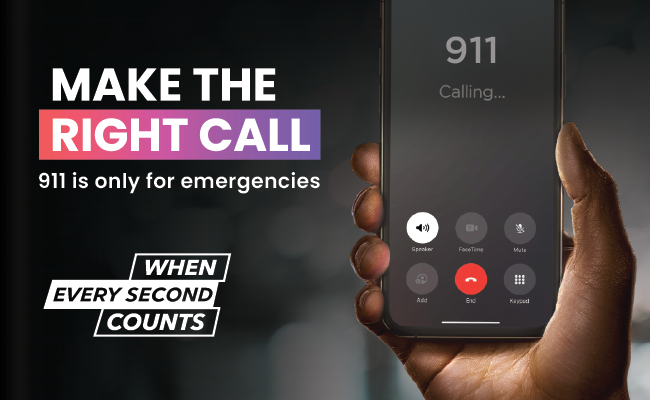Call 911 for police, fire, or medical emergencies
For government services, refer to or dial:
- 211 for social services like housing, employment or senior supports.
- 311 for municipal services such as garbage, building permits, and bylaws.
- Town of Caledon at 905-584-2272.
- Peel Region at 905-791-7800, toll-free for Caledon residents at 905-584-2216.
For health and mental health support, refer to or dial:
- 811 for confidential answers to health questions, 24 hours a day, 7 days a week.
- 988 - a Suicide Crisis Helpline that offers a safe space to talk 24 hours a day, 7 days a week.
To report a non-emergency situation or submit a complaint, dial:
- Peel Police at 905-453-3311
- Caledon O.P.P. at 1-888-310-1122
- Brampton Fire at 905-456-5788
- Caledon Fire at 905-584-2272 ext. 4303
- Mississauga Fire at 905-456-5700
- Ambulance 1-800-668-7821
Over 114,000 unnecessary calls
In 2024, the 911 call centre received 767,966 calls. Approximately 15% of these were accidental or non-emergencies.
When you call 911, the operator will ask if you require ambulance, fire, or police assistance. The operator will then quickly transfer your call to the appropriate emergency communicator.
This video shows the crucial role of 911 emergency communicator:
911 is available:
- For free from any telephone in Ontario, including pay phones or cell phones.
- In 156 languages. You’ll be connected to a telephone translation service.
- Through T.D.D. systems for people who live with hearing loss or who are deaf. (Dial 911 and hold the space bar until you get a response.)
If you live with hearing loss and your phone is registered with your wireless service provider, you can also text 911. - With VoIP (Voice over Internet Protocol) phones.
Make sure that your internet provider gives access to local 911 emergency communicators and that the service can display your address to the local 911 emergency call centre.
Call 911 immediately then get to a safe place if there’s a fire, crime in progress, an environmental or possible poisoning, or a life-endangering health emergency.
Fire
- A home or building is on fire
- You see or smell smoke
Crime
- A person’s life is in danger
- Someone is breaking into a house or car
- You hear gunshots
- Property or vehicle-related
- Someone is driving dangerously
- You are in, or witness, a serious car accident
- There’s an immediate threat to a person or property
Environmental or possible poisoning
- You smell gas
- Your carbon monoxide detector is going off
- There’s an environmental emergency, contamination, or poisoning
- Electrical wires are down
Health emergency
- Someone is choking
- Someone has chest pain or tightness
- Someone has a sudden severe headache, vision problems, weakness, or dizziness
- Someone has trouble speaking or has tingling in their face, arm, or leg
- A child is vomiting or has diarrhea (or both) and will not eat or drink
- You’re not sure how serious your medical emergency is
There may be times when you need to call the police or fire services during very important situations that pose no immediate risk to a person or property.
Do not call 911 for non-emergencies. Calling 911 unnecessarily takes resources away from other emergency situations.
Call or email Peel Regional Police for non-emergencies such as:
- A noise complaint.
- A crime that’s already happened.
- A cat is in a tree and won’t come down.
Contact Peel Regional Paramedic Services if:
- You need to find out which hospital your relative was transported to.
- You’re inquiring about a missing item after going to the hospital by ambulance.
If you accidentally call 911, stay on the line to tell the 911 emergency communicator that everything is okay.
Calling back takes resources away from other emergency situations.
If you hang up before speaking with the communicator, they will always call you back. They might also dispatch a police vehicle to investigate the situation.
The following content provides tips to avoid calling 911 by mistake:
- Lock your cell phone.
- Do not program 911 into your phone. Autodialing will not save time and could increase the chance of dialing 911 accidentally.
- Teach your kids how to use 911 and make sure you unplug your phone when you are teaching.
- The Country Code for India is 91, and some city codes in India start with 1. If you’re making a long-distance call to India, always enter the international code 011 before dialing the rest of the phone number.
The following content provides tips for making your 911 call run more smoothly.
- Stay calm and try not to panic. We’re here to help.
- Remember to use an outside line if you’re using a business or office phone.
- Identify if you need Paramedics, Fire, or Police.
- Tell the emergency communicator your exact location, especially if you are calling from a cell phone.
- Do not hang up – the emergency communicator may ask you for more information.
- If you cannot speak, try tapping on the phone to respond to the emergency communicator.
Help emergency services arrive faster
To find your exact geographic location, especially in a remote area, use the compass on your cell phone to get the latitude and longitude coordinates.
Clearly display your house number so emergency services can find your home. Make your house number stand out. If you live in a rural area or don’t have a mailbox on your property, place a sign at the end of your driveway that displays your house number.
If the emergency communicator does not hear or understand you, they may try to find your location and number using automatic identification systems and send emergency services to your location.
For more information about Canada’s 911 service, visit 9-1-1 services for Canadians.
